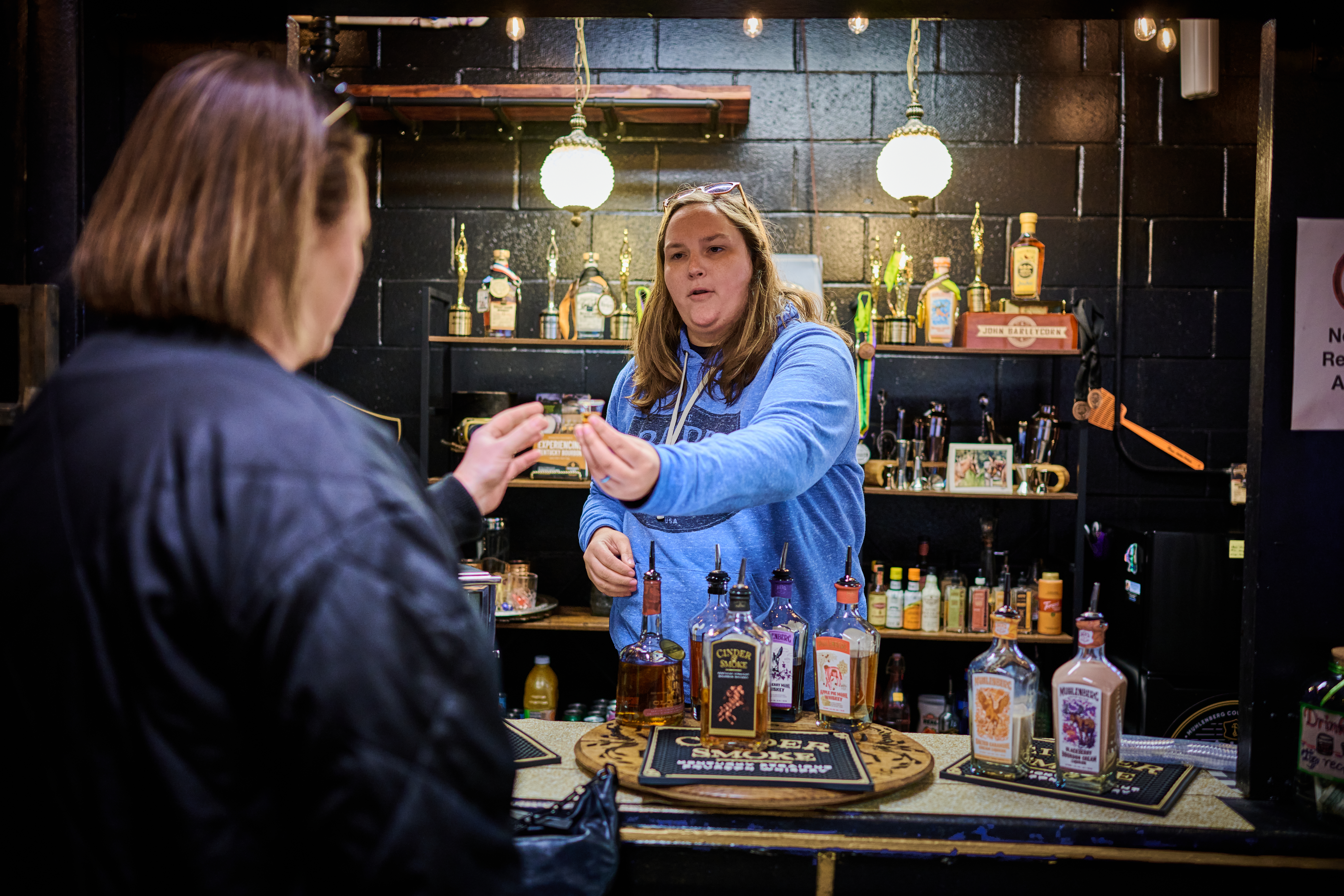
Todd Ramsay, president of distributor and importer Marram Fine Wines, with the last two bottles of Bard Distillery whiskey at Zyn wine market in Calgary. About 88 percent of Marram’s inventory comes from the United States. William DeShazer/For The Washington Post Thomas Bard expected a big boost this year, when stores in Saskatchewan and Ontario planned to start selling his distillery’s bourbon.
Instead, Canadian provinces yanked U.S. alcohol from their shelves — pitching Bard’s small Kentucky company into the center of a nascent trade war.

“It’s a huge deal when you get a new customer base,” Bard said. “So for this to be, just be taken away from us. .
.. That’s an absolute punch to the gut.
” Alcoholic drinks have become the subject of dueling tariff threats between the United States and its neighbors. But some craft liquor distillers such as Bard say they are particularly hard-hit because they see other countries as better targets for growth than parts of the highly regulated and crowded U.S.
market. “It’s easier to get into Canada than it is to get into some other states here,” said Bard, whose distillery has been selling its whiskey in Alberta and British Columbia for two years. Canada enacted a 25% tariff on U.
S. products including spirits and beer in early March in retaliation for levies imposed on Canadian goods by President Donald Trump. The European Union recently threatened to place a 50% tax on U.
S. whiskey, although it delayed those duties for several weeks. Trump said the United States would in turn tax E.
U. alcohol at 200%. Big brands can weather those financial ramifications — and may even benefit if some competitors are pushed out of the U.
S. market, experts say. But smaller players often lack the resources or infrastructure to navigate the U.
S. regulatory landscape. “We’re basically going to have to go back and start from scratch,” Bard said.
Only a small percentage of U.S. craft distillers sell their products in other countries, but more than half of those exporters ship to Canada, according to the American Craft Spirits Association.
Canada also accounts for nearly 40% of American craft beer exports, according to the Brewers Association. It’s also the largest export market for U.S.
wines, according to the Wine Institute. While provincial governments issue liquor licenses in Canada, permitting rules in the United States vary between states and at the municipal level. Some areas levy steep taxes on alcohol sales, and a post-Prohibition-era ban on alcohol producers owning bars requires domestic distillers to find distributors and retailers willing to sell their products nationwide.
“There’s probably 40-plus licenses they need to get,” said Kevin Anderson, an alcohol industry consultant and former alcoholic beverage regulator. Bard, for example, works with one Canadian importer and distributor who helps him sell his whiskey across western Canada. In the United States, he would probably have to find an individual distributor for each state, he said.
Likening U.S. states to “50 little countries,” Bard said: “Every one of them is different and hard to get into.
” Most U.S. states have a three-tier alcohol distribution system, where wholesalers connect alcohol producers to retailers.
Proponents say it prevents alcohol producers from monopolizing the market and stops stores from selling only their own products. The system also helps restrict underage sales, raises public revenue and stops counterfeit products, advocates say. “It is the gold standard for competition for choice,” said Michael Bilello, with the Wine and Spirits Wholesalers of America.
But critics say the system benefits big companies that offer distributors the most bang for their buck. Liquor and wine stores struggle to distinguish themselves from each other “because they’re all buying from the same wholesalers,” said Tom Wark, executive director of the National Association of Wine Retailers. The number of distributors has consolidated over time, making it difficult for small producers “to even get on the truck,” said Dan Croxall, an expert in craft beer law at the University of the Pacific.
Bilello said that consolidation, which has happened across the industry, has allowed distributors to have better technology and service, and that wholesalers have invested heavily in distributing and marketing craft brands. Some small alcohol brands hope to make up lost revenue by redoubling their efforts in the United States, but they’ll face obstacles that were already confronting the alcohol industry before the threat of a trade war. Consumers have cut back on discretionary spending as inflation drives up prices.
Younger generations are drinking less amid broader wellness and sobriety movements, and as mocktails and cannabis products have grown in popularity, industry observers said. Beyond duties specifically on alcohol, distillers and craft brewers could feel the pain of a trade war in other ways. Recently imposed tariffs on products from China, as well as duties on steel and aluminum, are expected to drive up costs for cans, glass and corks used for packaging.
About 75% of packaged craft beer today is packaged in cans, Croxall said. “The tariffs are just another ‘Oh, my god. Is this just another thing that’s going to push us towards closure?’” he said.
“It’s not a great environment right now.” It’s unclear how this year’s tariffs will affect the industry’s bottom line or if that could translate to higher prices for consumers. Sales fell 20% when the E.
U. levied a 25% tax on U.S.
whiskey from 2018 to 2022, according to the Distilled Spirits Council of the United States. The retaliatory U.S.
tariff on some European alcohol led to a decline of more than 30 percent in U.S. imports of Scotch whisky.
The United States has never enacted tariffs as high as 200% on alcohol, but another country’s experience shows how import levies can damage the industry. Australia’s wine exports to China were “pretty much killed” when the Chinese government levied tariffs as high as 218 percent from 2021 to 2024, said Marten Lodewijks, president of IWSR Americas, a global drinks data and analytics company. Some alcohol companies have already felt a hit.
Texas-based customs broker J.D. Gonzalez said one of his clients balked when faced with $9,000 in tariffs to transport 20,000 pounds of tequila from Mexico to the United States in early March.
The client was unlucky: The United States enacted 25% tariffs on Canadian and Mexican goods on March 4 but paused most of the duties days later. Todd Ramsay, Bard’s Alberta-based importer and distributor, said he has been crushed by the trade war, as nearly 90% of his inventory comes from the United States. Roughly $200,000 worth of his imported American alcohol was sitting in an Alberta warehouse when he learned the province had restricted the sale of U.
S. liquor, leaving that inventory unable to be sold, transferred or returned. Alastair Brogan’s craft-whiskey distillery in Colorado typically gets 5% of its revenue from Canadian sales.
Brogan no longer expects that this year, but he considers the bigger hit to be the loss of goodwill toward American whiskey and the brand he built. “All the energy, resources that American distilleries have put into being in Canada has just been wiped out.” he said.
We believe it’s important to offer commenting on certain stories as a benefit to our readers. At its best, our comments sections can be a productive platform for readers to engage with our journalism, offer thoughts on coverage and issues, and drive conversation in a respectful, solutions-based way. It’s a form of open discourse that can be useful to our community, public officials, journalists and others.
Read more...
We do not enable comments on everything — exceptions include most crime stories, and coverage involving personal tragedy or sensitive issues that invite personal attacks instead of thoughtful discussion. For those stories that we do enable discussion, our system may hold up comments pending the approval of a moderator for several reasons, including possible violation of our guidelines. As the Maine Trust’s digital team reviews these comments, we ask for patience.
Comments are managed by our staff during regular business hours Monday through Friday and limited hours on Saturday and Sunday. Comments held for moderation outside of those hours may take longer to approve. By joining the conversation, you are agreeing to our commenting policy and terms of use .
More information is found on our FAQs . You can modify your screen name here . Show less Please sign into your Press Herald account to participate in conversations below.
If you do not have an account, you can register or subscribe . Questions? Please see our FAQs . Your commenting screen name has been updated.
Send questions/comments to the editors..















